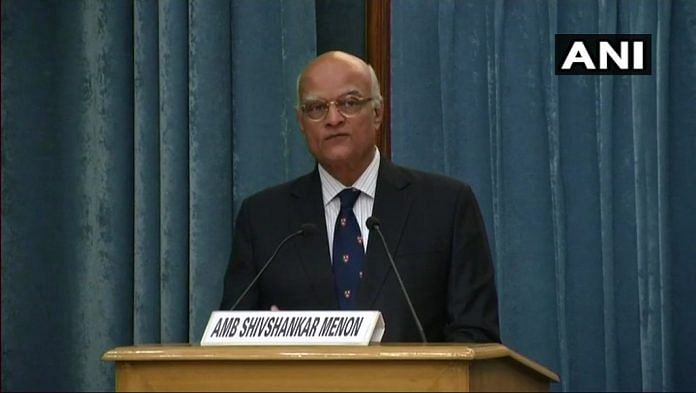New Delhi: The Chinese Communist Party (CCP) has shifted over time from being committed to the Communist ideology to now following ultra-nationalism or nativism, India’s former foreign secretary Shivshankar Menon has said.
“The legitimacy of the party has shifted over time from ideology, to commitment to socialism and communism in the 50s — effectively removed by the Great Leap Forward and the Cultural Revolution — to a slowing down of economic growth, and now to ultra-nationalism or nativism,” Menon said at the virtual All India Conference of China Studies, hosted by the Institute of China Studies (ICS) Thursday.
Other panellists at the event included ICS Director Ashok K. Kantha; Peter Rimmele, Resident Representative, India office of German think-tank Konrad-Adenauer-Stiftung; Bidyut Chakrabarty, Vice-Chancellor, Visva-Bharati University, Santiniketan; Sabaree Mitra, professor at JNU; and Avijit Banerjee, professor, Cheena Bhavana, Visva-Bharati University, Santiniketan. ThePrint was a digital partner for the event.
Also read: China’s Land Border Law is more sinister than it lets on. India needs a course correction
‘India-China border clash to do with Beijing’s domestic struggles’
Menon explained that China’s ultra-nationalism has led to two consequences — first, it is playing into the CCP’s need for an external focus to consolidate domestic support, and second, territorial disputes are becoming “sovereignty” disputes.
He said that domestic factors do play a role in any country’s foreign policy, but this appears to be more pronounced for China, given Beijing’s aim to reinstate its “imagined past”.
Speaking on the India-China tensions at the Line of Actual Control in Ladakh, which began in May 2020 and are still ongoing, he said the timing had much to do with the domestic struggles China was facing at the time.
“Spring 2020 was when China itself was going through an internal political reordering thanks to the effects of Covid and external pressures with the world blaming China [for the pandemic],” said Menon.
Ultra-nationalism has also led China to treat border issues, such as the one with India, as issues of sovereignty and thus, “zero-sum” issues, said Menon.
“China is now treating all border issues as sovereignty, and not as a dispute, which by definition can be settled by discussion, by negotiation, by bargaining or some give-and-take,” he said.
Apart from the one with India, China currently faces 16 ongoing territorial disputes.
Arunachal Pradesh or “Southern Tibet”, as China calls it, may someday be part of Beijing’s ‘expanding’ list of core interests with regards to territorial disputes, Menon remarked.
Rimmele, meanwhile, issued a warning about China’s attempt to resurrect its imagined past. “German Emperor Wilhelm II called upon all powers to defend the most holy goods…against the imagined aggression from the East. If today’s China is continuing (on) its current path, this view might see a revival with the only difference being that this time, the aggressions will not be imagined,” he said.
(Edited by Paramita Ghosh)
Also read: Xi Jinping wants to be in Mao, Deng’s league. Now, Chinese media is making him look muscular



